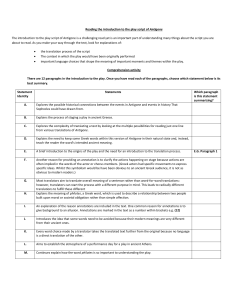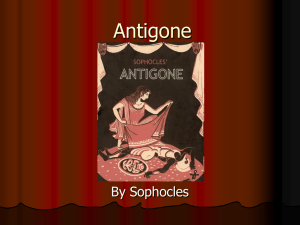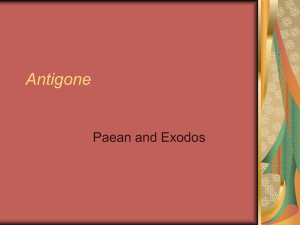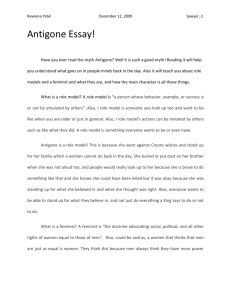Liz Renda
advertisement
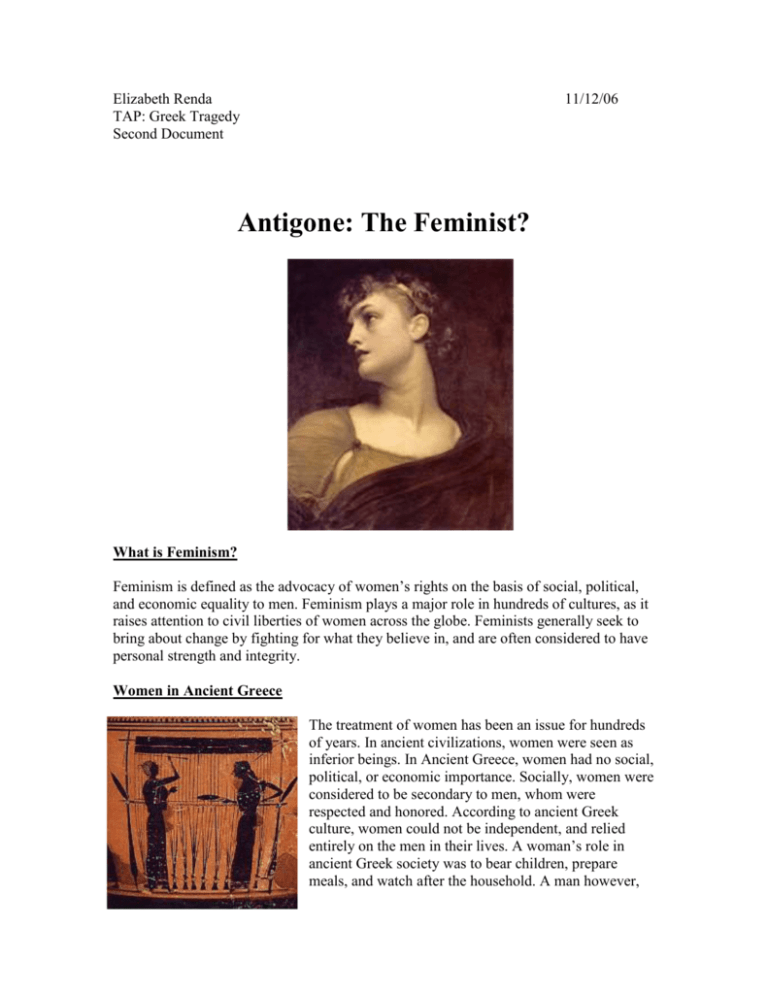
Elizabeth Renda TAP: Greek Tragedy Second Document 11/12/06 Antigone: The Feminist? What is Feminism? Feminism is defined as the advocacy of women’s rights on the basis of social, political, and economic equality to men. Feminism plays a major role in hundreds of cultures, as it raises attention to civil liberties of women across the globe. Feminists generally seek to bring about change by fighting for what they believe in, and are often considered to have personal strength and integrity. Women in Ancient Greece The treatment of women has been an issue for hundreds of years. In ancient civilizations, women were seen as inferior beings. In Ancient Greece, women had no social, political, or economic importance. Socially, women were considered to be secondary to men, whom were respected and honored. According to ancient Greek culture, women could not be independent, and relied entirely on the men in their lives. A woman’s role in ancient Greek society was to bear children, prepare meals, and watch after the household. A man however, fulfilled the “important” duties in Greek society. These duties included political advocacy fighting battles, protecting his family. In Ancient Greece, feminism was unheard of. Women lived in fear of speaking out against men, and would not dare contradict the ways of society. Women feared facing physical abuse, angering the gods, and sometimes death. Women in Modern Greece Although women are no longer legally inferior to men, the sense of feminine inferiority continues to exist in modern Greek society. In this sense, Greek society has not changed dramatically since the times of the tragedians. Although women are admired for their great beauty, they are still felt to be lower than men. In her article What Greece is Really Like (For Women), Stephanie Kordas makes several points regarding the treatment of Greek women. Kordas states that for a Greek man, an uneducated woman is more appealing than an educated woman. This points out the fact that men are mainly interested in having wives of lower intellectual standing. Men continue to dominate households, and women continue to bear children, care for the family, and fulfill other household duties. Another important fact that Stephanie Kordas points out in her article is the fact that Greek men tend to be unfaithful. According to Kordas, Greek men often have several different mistresses, showing their lack of commitment to their wives. Kordas also says that in terms of employment, women are underpaid, overworked, and not considered valuable workers. Sophocles’ Antigone In Sophocles’ Antigone, The daughter of Oedipus breaks the social norm by going against the government. In the beginning of the play, the sons of Oedipus, Eteocles and Polynices are pronounced dead. The two brothers killed each other due to a bitter fight over the throne. Polynices was angry that his brother had been named next in line for the throne, and preceded to send soldiers to fight against Eteocles and Thebes. Creon, the current ruler, declares Polynices as a traitor to Thebes, and a man of dishonor. Because of this, a proper burial of Polynices is forbidden. Antigone, who believes that an improper burial will anger the Gods, decides to bury Polynices herself. When Creon learns of this, he holds Antigone captive, and threatens to bring death upon her. In her defense, Haemon, whom is both Creon’s son, and Antigone’s fiancé, confronts his father. Haemon threatens his father that if Antigone were to die, someone else would die as well. Greatly angered, Creon locks Antigone in a cave, and leaves her for starvation. The profit Tiresias then informs Creon that if he were to kill Antigone, death would fall upon his own flesh and blood. Creon then decides to free Antigone, and give Polynices a proper burial. Despite his change of mind, Creon is too late, as Antigone had already hung herself in the cave. In response to Antigone’s death, Haemon precedes to bring death to himself. Creon ultimately suffers great loss and sadness at the sight of his dead son. Feminism? Or Merely Ignorance? It was certainly against the norm of a typical ancient Greek woman to rebel against a male authority. This is reason to believe that Antigone may have shown signs of early feminism. Women in ancient Greece were generally fearful that rebellion against male authority would lead to unfortunate circumstances. The fact that Antigone went against the orders of Creon shows definite female power. Antigone followed her beliefs strongly, and ignored the threats of higher powers telling her to do otherwise. Antigone took responsibility for her actions, and did not try to hide the fact that she was rebelling. Also, the fact that Antigone commits her own death at the end, shows her unwillingness to accept male conquer. On the other hand, Sophocles may have been trying to show female ignorance and stupidity. The fact that Antigone rebelled against male power, may show her “lack of understanding” of her social status. Although Sophocles’ intentions can never be known, this point may prove valuable in opposition to the thought of Antigone possessing feminist qualities. Although there are two separate viewpoints, “Antigone the Feminist” proves to be stronger. Antigone can absolutely be said to be an early example of a feminist, because she possesses the qualities seen in both historic, and modern day feminists. Works Cited 1. Kordas, Stephanie. What Greece is Really Like (For Women). 2005. November 12, 2006. <http://www.greecetravel.com/kordas/forwomen.htm> Note: This Article is based on a woman’s personal experience when she traveled to Greece. Because of this, it merely points out her own personal perspective on the way women are treated in modern day Greek society. 2. Wikipedia. Feminism. 2006. November 12, 2006. <Http://en.wikipedia.org/wiki/Feminism> This website provided detailed information regarding feminism. It also explores the qualities and characteristics of feminists in both modern day, and historic societies.

